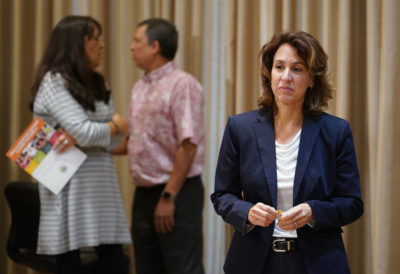A Hawaii Department of Education committee charged with making recommendations to the school superintendent regarding public high schoolsŌĆÖ compliance with the Title IX civil rights law has been revived after lying dormant for six years.
The DOE Gender Equity in Athletics Committee has been quietly reestablished in the wake of a wide-ranging federal lawsuit brought by the ACLU of Hawaii late last year against the DOE and the Oahu Interscholastic Association over alleged gender disparities in Campbell High School athletics.
Those disparities include the lack of a girlsŌĆÖ athletic locker room and boys teams’ access to more experienced coaching staff, prime time games and promotion by their school.

Three sitting members of the committee, believed to include about 12 members, confirmed their participation to Civil Beat. The development was also briefly mentioned in an item on the laying out the superintendentŌĆÖs priorities.
A DOE spokeswoman, however, has declined to confirm the committee’s existence, membersŌĆÖ names and identities or its specific tasks.
DOE Communications director Lindsay Chambers said on Wednesday that any inquiry on the topic will be treated as a formal public information request, “given that some of your questions address an active lawsuit.ŌĆØ
The committee, which has met once in March and is scheduled to meet again in July, is a revival of a long-standing working group that convened between 2001 to 2013.
Its purpose was to make recommendations to the DOE superintendent about how schools could comply with Title IX, the federal law prohibiting sex discrimination in any federally funded education program.
The DOE group was an extension of a commission established in 2000 under the “Gender Equity in Athletics Law,” passed by the Hawaii Legislature in 1999 in response to troubling reports of gender disparities in high school athletics that were coming to light in the years since the enactment of Title IX in 1972.
That commissionŌĆÖs final report, issued in 2003, noted lingering issues at the five public high schools it studied, including disproportionate sports participation rates by girls compared to their total student enrollment┬Āand need for facilities’ upgrades, according to ACLUŌĆÖs lawsuit.
Previous Committee
Meanwhile, the DOE committee pressed on.
It continued to meet over the next decade, sharing its findings in open meetings. Chaired by Mike Victorino, now the mayor of Maui, it included various individuals from within and outside the department, including Jill Nunokawa,╠²a civil rights specialist for the University of Hawaii at Manoa.
“We would advise the superintendent on gender equity initiatives and compliance benchmark indicators, (school) monitoring and assistance in implementation, identifying challenges and advocating the Legislature for additional resources,” she said.
Every public high school in Hawaii was required to do a review of their athletics programs, with the data being reported to the DOE’s Civil Rights Compliance Office, she added.
The committee, which met twice-yearly, would examine the DOE’s facilities “priorities” list and work with the facilities division to “identify places that made the most sense” in terms of helping lift projects up off the ground.
For instance, identifying the need for a girls’ athletic locker room at Kalani High School ŌĆö completed ŌĆö occurred around that time, said Nunokawa.

In 2013, the DOEŌĆÖs committee was abruptly disbanded under then-school superintendent Kathryn Matayoshi.
In a June 2016 lawsuit filed in Oahu First Circuit Court, Susan Kitsu, the former director of the DOEŌĆÖs Civil Rights Compliance Office, alleged that Matayoshi in 2012 told her staff to ŌĆ£stop gathering Title IX data if it was not ŌĆślegally requiredŌĆÖ because it took up too much time and was not necessary,ŌĆØ according to the complaint.
ŌĆ£(Kitsu) informed Superintendent Matayoshi that without the data, (the DOE) could not assess whether it was complying with the Title IX gender equity in athletics requirements,ŌĆØ the complaint states.
Kitsu served as director of the DOEŌĆÖs Civil Rights Compliance Office from 2005 to 2015, when she was let go from her position.
Her lawsuit against the DOE, which is awaiting a ruling, alleges employment discrimination and retaliation based on her firing after she notified top education brass of purported DOE violations of federal laws including Title IX, Title VII, mandatory reporting of child abuse and the Americans with Disabilities Act.
Kitsu declined comment for this story.
‘No Real Oversight’
What spurred the DOE under current superintendent Christina Kishimoto to bring back the DOE’s gender equity committee is unclear, but the absence of a committee was raised┬Āat a Board of Education meeting in October by Nunokawa.
ŌĆ£Since the end of our regular meetings five years ago,ŌĆØ Nunokawa said in , ŌĆ£the Department of Education has struggled and reverted back to its prior non-compliant ways. There is no real oversight, accountability, institutional knowledge, authentic commitment, and legal competency.ŌĆØ
Shortly thereafter, the ACLU of Hawaii filed its Dec. 6 lawsuit, alleging a long list of gender inequities in HawaiiŌĆÖs largest public high school, including more desirable competition venues and game times for boys than girls, disproportional access to experienced coaching staff, greater athletic scholarship opportunities for boys than girls and alleged retaliation against girls who protested over such conditions.
While the plaintiffs are two unidentified Campbell senior female athletes, the suit seeks to represent all current and former Campbell High female athletes as a broader class action lawsuit. Currently in discovery, the suit seeks remedies that include a DOE compliance plan and court monitoring of such a plan.
Several months after NunokawaŌĆÖs testimony, the DOE gender equity committee was re-formed. Nunokawa was asked to be a participant.
ŌĆ£In their wisdom, the DOE administration decided it was a prudent and positive choice to move forward with a committee on gender equity which would incorporate some very committed and knowledgeable resources,ŌĆØ she said.
The ACLU was more circumspect to the development.
ŌĆ£Like any committee out there, the devil is in the details,” said ACLU of Hawaii Legal Director Mateo Caballero. “WeŌĆÖd have to understand whoŌĆÖs on the committee, what kind of training they have, do they understand Title IX, ultimately (its) decision-making authority.ŌĆØ
DOE administrator and current OIA executive director Ray Fujino, who was active in the former gender equity committee, confirmed he is serving as chair.
Dana Takahara-Dias, a vice-principal at Kaiser High and the former athletic director of Moanalua High, also confirmed her participation.
Other individuals believed to serve on the committee are Wendy Anae, athletic director of Kahuku High, although she did not directly respond to a question from Civil Beat, and Kalei Namohala, athletic director of KaŌĆÖu High on the Big Island, who could not be reached for comment.
According to Takahara-Dias, much like in the past, the committee will be analyzing data to be collected by the DOEŌĆÖs and then make recommendations to Kishimoto on how schools can comply with Title IX.

ŌĆ£We take a look at the existing state of where we’re at with Title IX,ŌĆØ she said. ŌĆ£We’re primarily going to take a look at the athletic component. We take a look at the reports that the department is generating.”
The committee will be analyzing girls’ rates of participation in high school athletics compared with their total enrollment down to granular details like where they practice, what times they practice or whether they have access to athletic locker rooms and basic sports equipment on par with boys’ teams.
“If you ask the underrepresented sex which field or locker room (they use), or which time (they prefer) to play or (the) season and allow them to choose, then you begin to understand what equity looks like,” Nunokawa said.
Among KishimotoŌĆÖs from the March 7 BOE agenda is a 10-year ŌĆ£Title IX Athletics PlanŌĆØ that includes schools coming up with athletic self-assessments that will begin in the 2020-21 school year on a three-year rotating basis.
It also references broader, unspecified ŌĆ£plansŌĆØ by the DOEŌĆÖs Office of School Facilities and Support Services and┬ĀOffice of Curriculum and Instructional Design to ŌĆ£assess and propose options for the DepartmentŌĆÖs athletic program going forward.ŌĆØ
ŌĆ£I think the DOE got in trouble when they no longer used the committee. They stopped taking data,ŌĆØ Nunokawa said. ŌĆ£When thereŌĆÖs that type of non-reporting, that complacency, it will sometimes revert to bad behavior.ŌĆØ
She praised the revival of the committee and its make-up, pointing to its mix of current and former school athletic directors.
“The truth is, it takes a sustained commitment,” she said. “We did make inroads with our (former) committee, but it regresses, reverts back when you have certain personnel who think theyŌĆÖre above the law.”
 GET IN-DEPTH
REPORTING ON HAWAIIŌĆÖS BIGGEST ISSUES
GET IN-DEPTH
REPORTING ON HAWAIIŌĆÖS BIGGEST ISSUES
We need your help.
Unfortunately, being named a┬Āfinalist for a┬ĀPulitzer prize┬Ādoesn’t make us immune to financial pressures. The fact is,┬Āour revenue hasnŌĆÖt kept pace with our need to grow,╠².
Civil Beat is a nonprofit, reader-supported newsroom based in ▒ß▓╣Ę╔▓╣Š▒╩╗Š▒. WeŌĆÖre looking to build a more resilient, diverse and deeply impactful media landscape, and┬Āwe hope youŌĆÖll help by .



